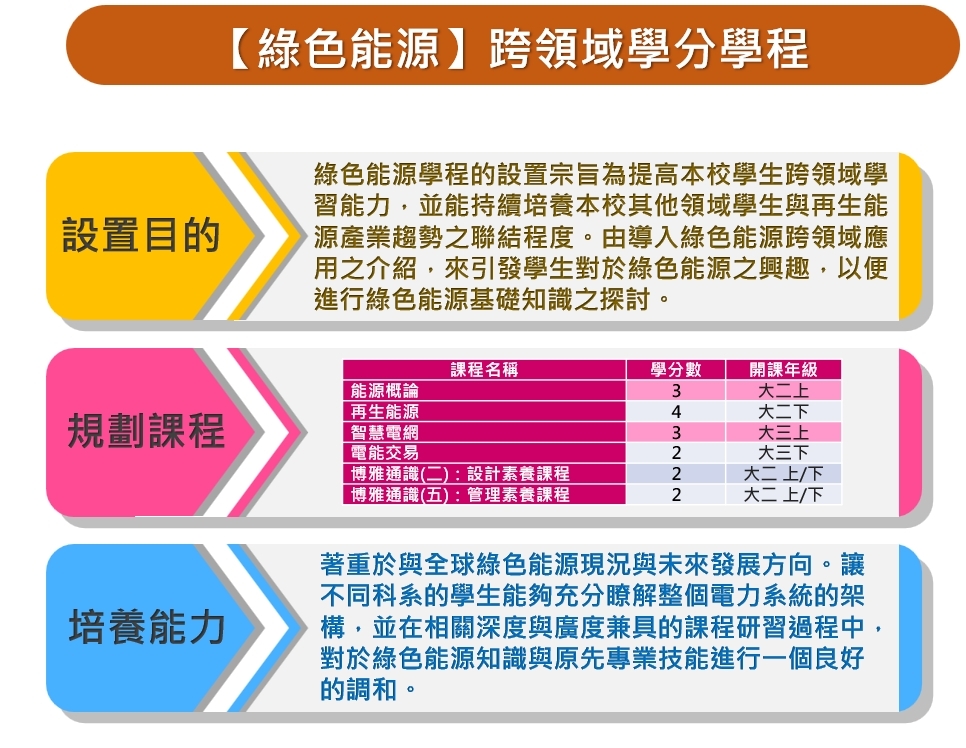Interdisciplinary Program

【Application Process】Interdisciplinary Credit Program
▲Process Description:Please check the attachment
【Digital Smart Manufacturing】Micro Program
Purpose and Objectives
With the rise of Industry 4.0, ushering in a revolution in automated smart production, advancements in technologies such as artificial intelligence have made intelligent robots a key player in this industrial revolution. In response to the government's "Smart Robot Industry Promotion Plan" and the growing demand for talent in smart manufacturing technologies within future manufacturing or traditional industries, the Interdisciplinary Credit Program in Robotics Practice and Applications has been established. This program integrates cross-disciplinary learning resources to cultivate more competitive robotics engineering professionals.
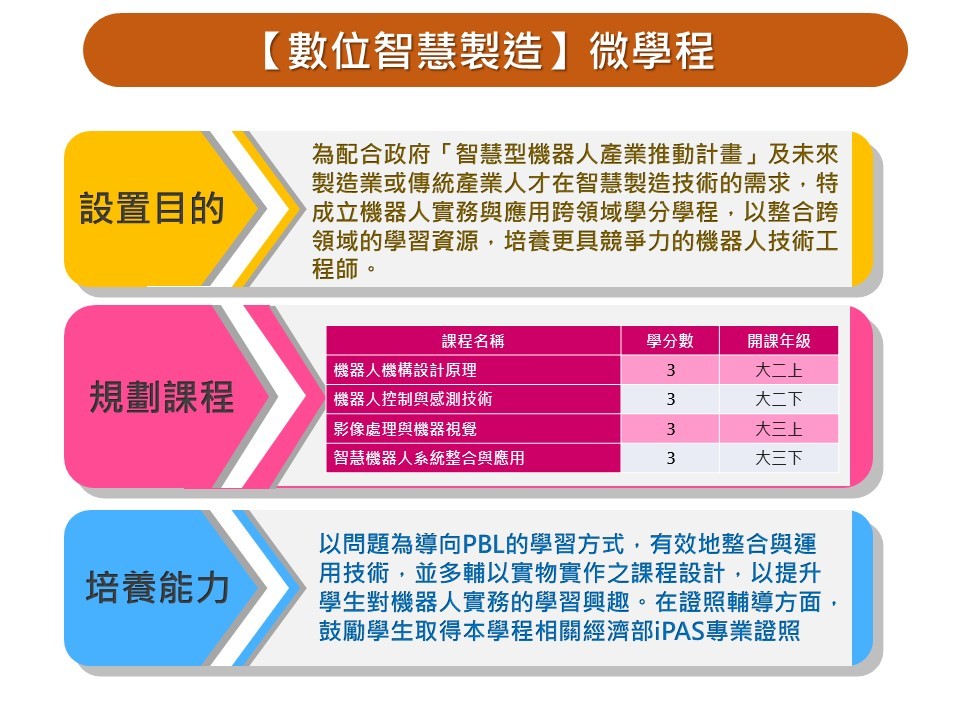
【Applications of Artificial Intelligence in Social Networks】Interdisciplinary Credit Program
Purpose and Objectives
The purpose of the Artificial Intelligence Program is to enhance students' interdisciplinary learning capabilities and to continually strengthen the connection between students from various fields and trends in the IT industry. This program focuses on introducing interdisciplinary applications of artificial intelligence to spark students' interest in AI, facilitating discussions on foundational knowledge of the field. The aim is to establish the essential competencies needed for AI technical talent and to promote the foundational understanding of AI-related knowledge.
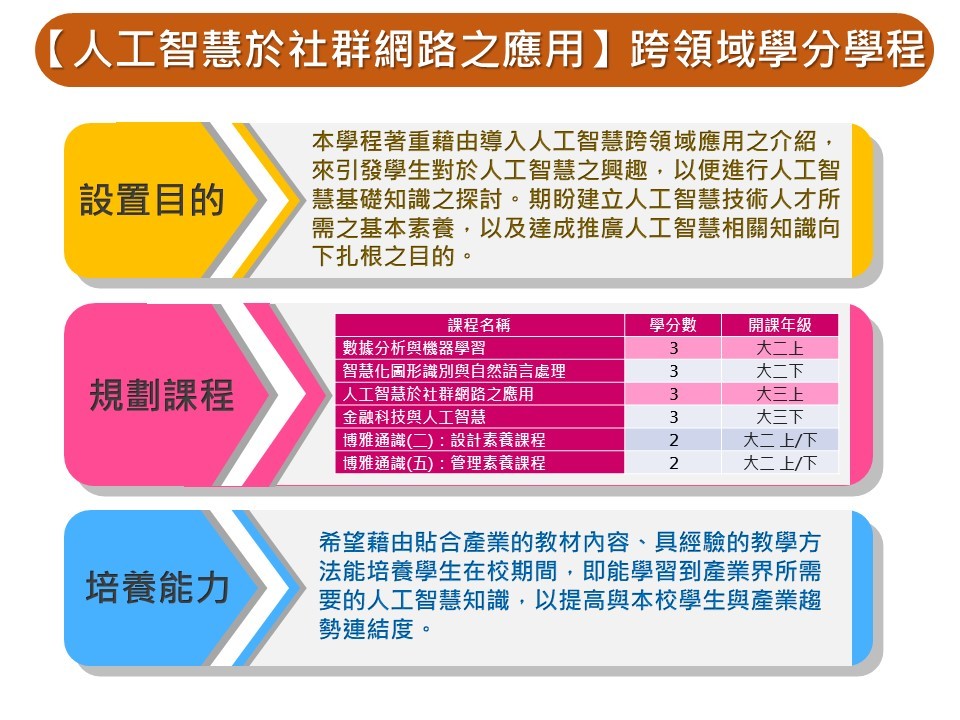
【5G Practice and Applications】 Interdisciplinary Credit Program
Purpose and Objectives
Qualcomm in the United States states on the 5G economy that by 2035, the total value related to 5G created directly or indirectly by Taiwan will reach $134 billion. Therefore, the course “5G Practice and Application Interdisciplinary” is offered to cultivate experts in testing and tuning mobile communication modules.
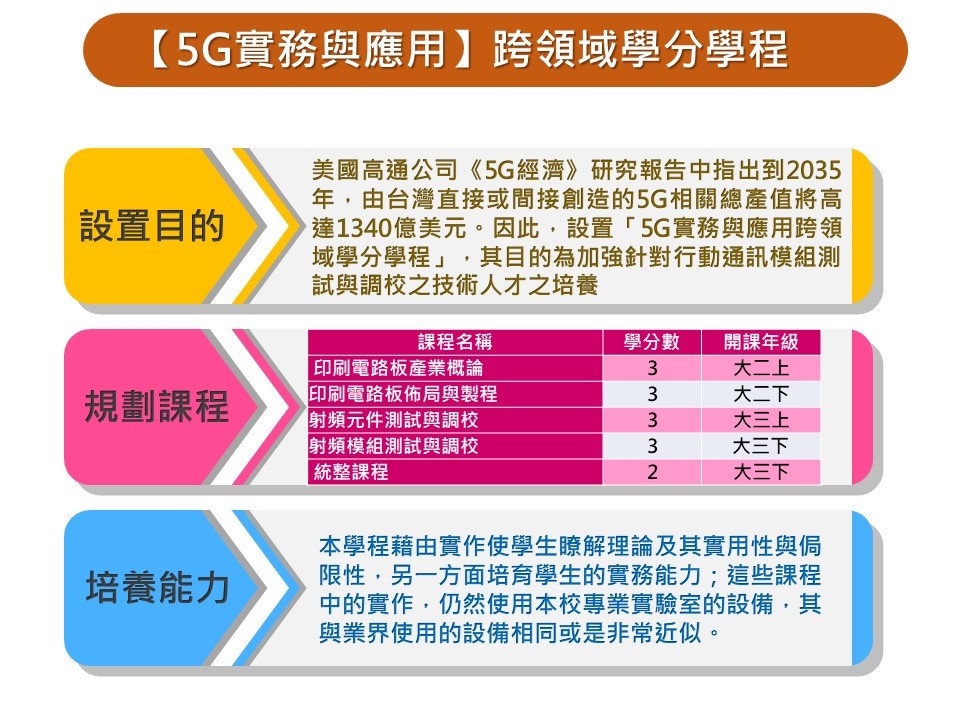
【Artificial Intelligence of Things】Interdisciplinary Credit Program
Purpose and Objectives
With the development of information technology and networking technologies, the ability to collect and store information, as well as the capacity for data analysis and application, have continuously advanced. Proper utilization of these innovations can enhance convenience in daily life, promote economic development, and ensure environmental safety. The development and application of AIoT (Artificial Intelligence of Things) technologies are at the core of this transformation. The establishment of this program aims to integrate IoT technology learning resources and cultivate students interested in developing the competitive skills needed in the smart IoT field.
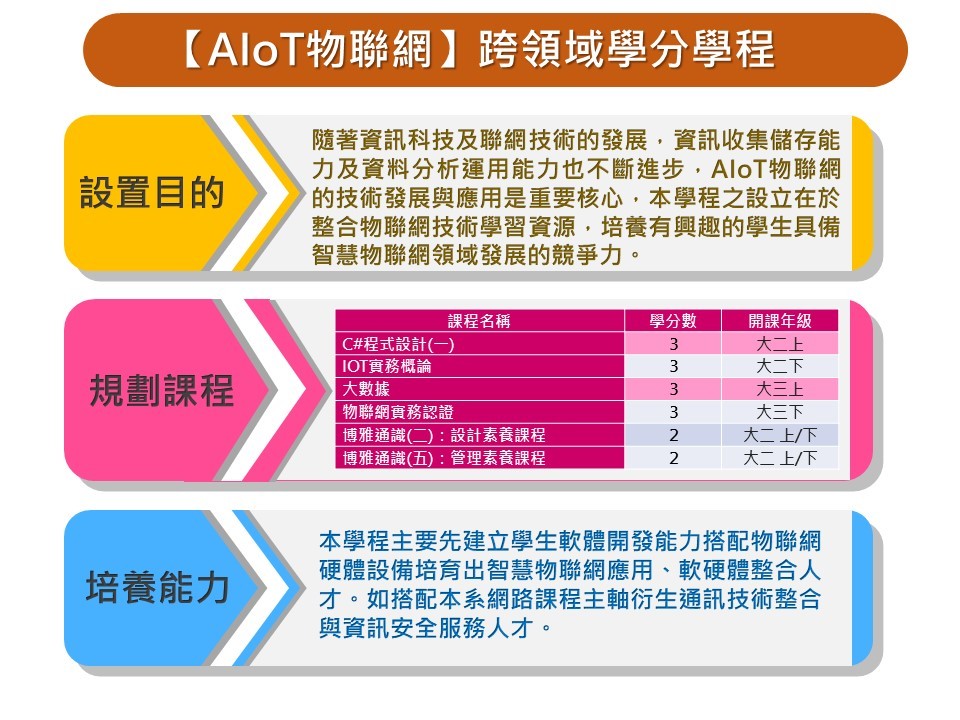
【Printed Circuit Board Design and Smart Manufacturing】Interdisciplinary Credit Program
Purpose and Objectives
In the wave of Industry 4.0, smart manufacturing is dominating the industry. According to TrendForce, the global smart manufacturing market reached $320 billion in 2020 (about 9.6 trillion TWD). This course trains students in smart manufacturing to respond to recent and future industry needs.
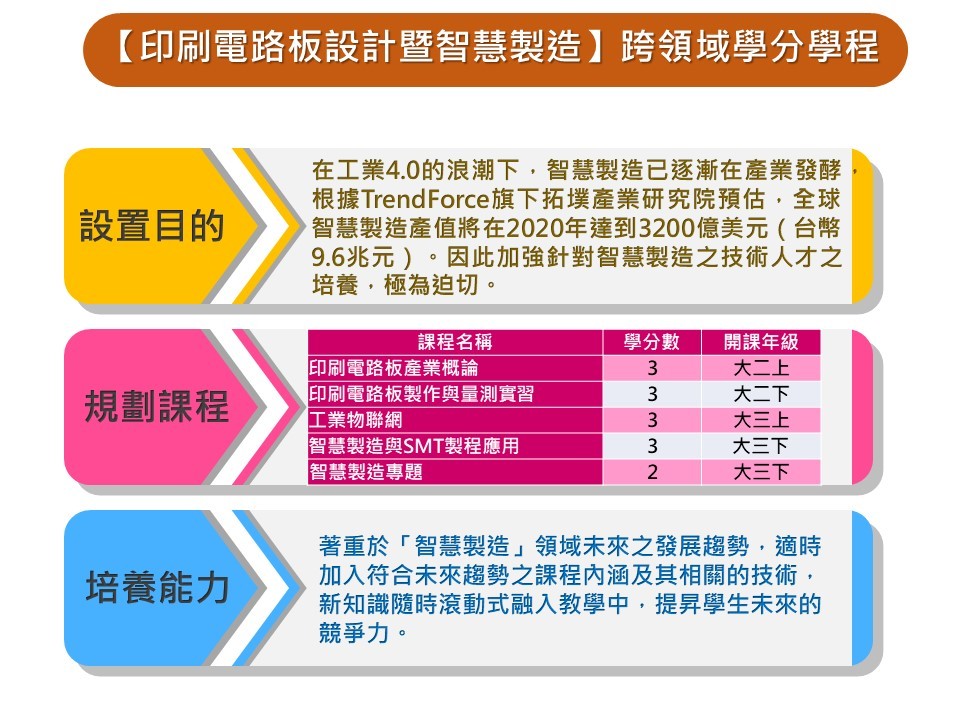
【Smart Electric Vehicle】Interdisciplinary Credit Program
Purpose and Objectives
In recent years, global awareness of energy conservation, carbon reduction, and environmental protection has been rising. Governments around the world have begun announcing restrictions on fuel-powered vehicles while promoting electric vehicle (EV) policies, subsidies, and timetables. U.S. President Joe Biden has also announced plans to replace approximately 650,000 government-owned vehicles with electric ones, with an investment of $500 billion annually, aiming for a 100% clean energy and zero-emission vehicle fleet by 2050. As a result, there is an urgent need to strengthen the cultivation of technical talent in the field of smart electric vehicles.
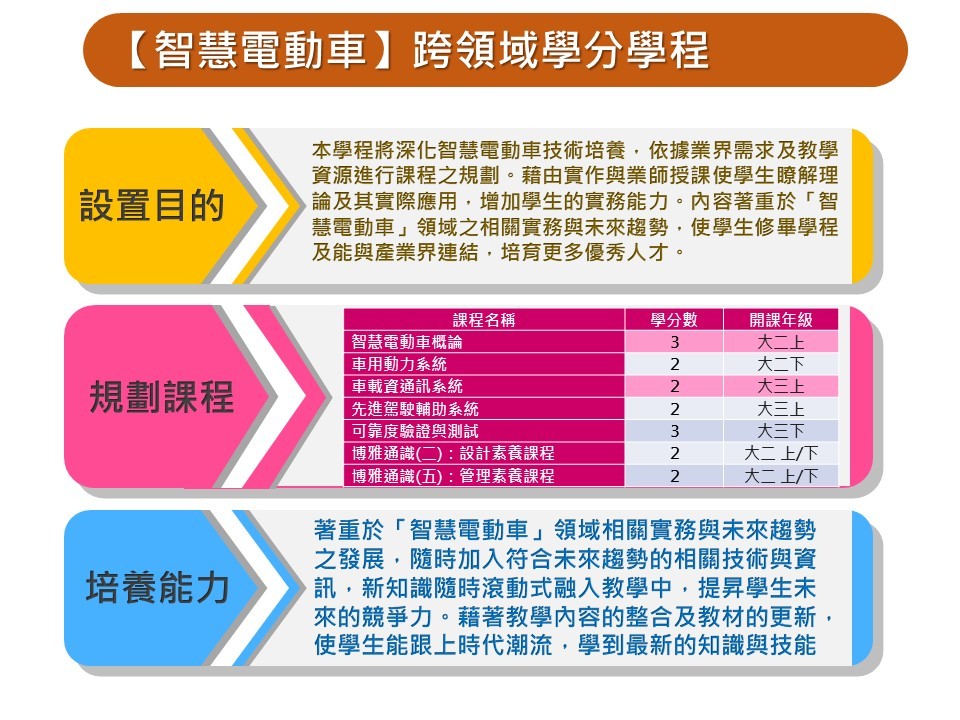
【High-Frequency High-Speed Transmission Interface Design and Testing】Interdisciplinary Credit Program
Purpose and Objectives
With the growing demand for high-frequency transmission, automotive, medicine, and Internet of Things (IoT) industries are focusing on high-speed interconnect electronic modules. Thus, testing related devices and their verification are mandatory. This course nurtures professionals in high-speed interconnect electronic module design and testing to satisfy industry needs for hardware and software in fast transmission electronics. Students are equipped with theoretical and practical skills to maintain Taiwan's industry competitiveness. This course fits students interested in high-frequency and high-speed transmission.
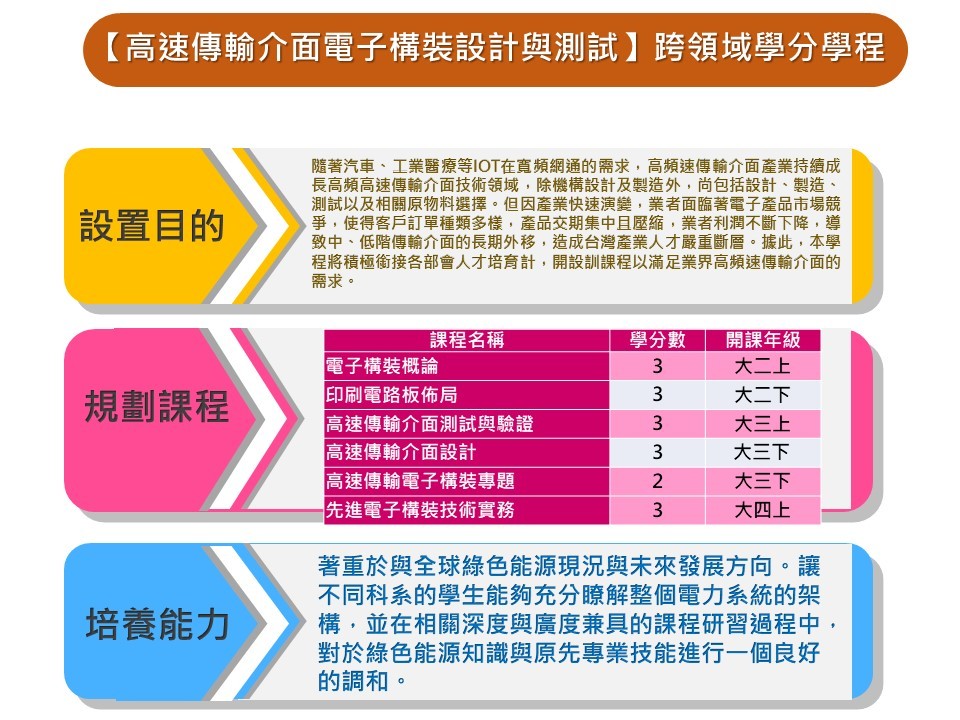
【Green Energy】 Interdisciplinary Credit Program
Purpose and Objectives
The purpose of the Green Energy program is to enhance students' ability to engage in interdisciplinary learning and to continuously foster connections between students from various fields and the trends of the renewable energy industry. The program focuses on introducing interdisciplinary applications of green energy, aiming to spark students' interest in the field of green energy and to explore the fundamental knowledge of renewable energy. The goal is to establish the foundational skills required for cultivating green energy technology professionals and to promote the dissemination of green energy knowledge at the grassroots level.
